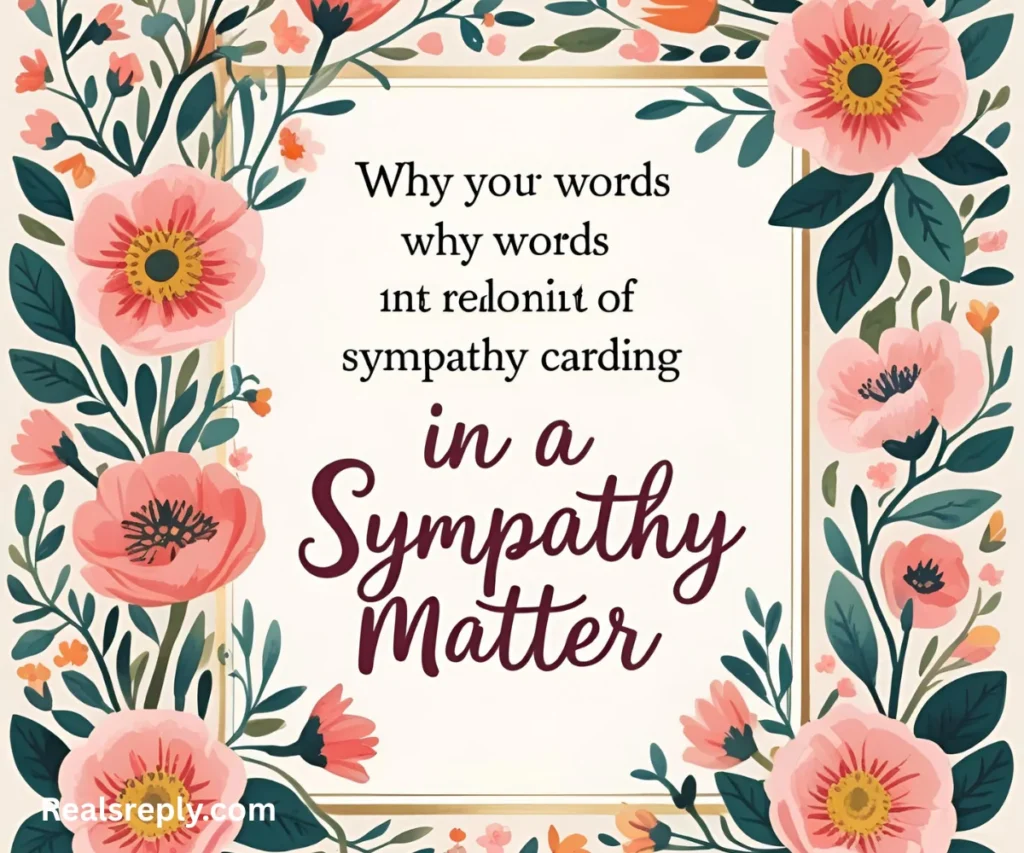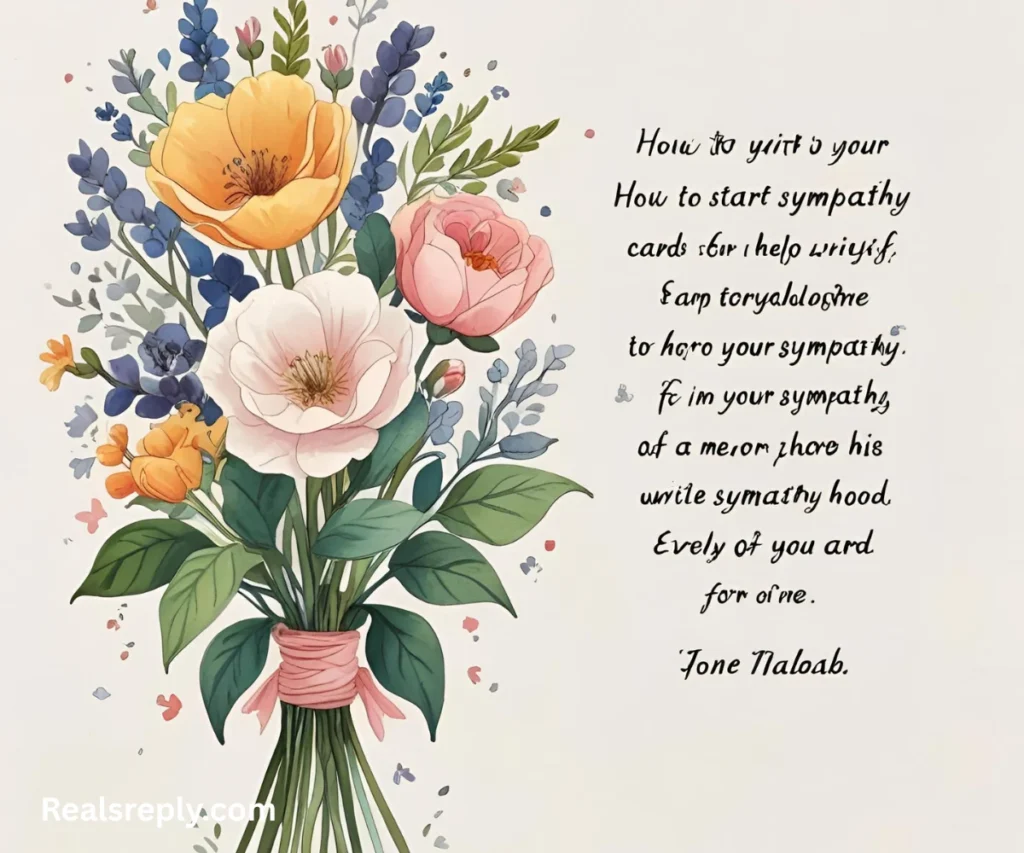Losing someone is never easy, and finding the right words for a sympathy card can feel overwhelming.
You want to offer comfort, but what if you say the wrong thing? Don’t worry—this guide on what to say in a sympathy card will help you craft a message that’s heartfelt and meaningful.
Whether it’s for a friend, coworker, or family member, your words can bring a little light to someone’s dark day.
We’ll share simple tips, real-life examples, and phrases to avoid, so you can express your care with confidence.
Let’s make sure your message shows love and support when it’s needed most.
Why Words in a Sympathy Card Matter

Words have power, especially during grief. A sympathy card is more than a gesture—it’s a way to show you’re there. When someone is hurting, your message can remind them they’re not alone. But vague or overly formal words can feel distant. Personal, sincere messages connect best.
Scenario: Your friend Sarah lost her mom. She’s overwhelmed, and a card from you could lift her spirits.
What to Say: “Sarah, I’m so sorry for your loss. Your mom’s smile lit up every room. I’m here for you.”
What Not to Say: “She’s in a better place.” (This might feel dismissive to Sarah’s pain.)
Keep it simple, personal, and from the heart to make a real impact.
How to Start Your Sympathy Card Message

Starting a sympathy card can be the hardest part. You want to strike the right tone—caring but not pushy. Begin with a warm greeting and acknowledge the loss directly. This shows you’re not avoiding their pain. Personalize the opening by mentioning the person who passed or a specific memory.
Scenario: Your coworker John lost his brother. You worked with his brother briefly and want to send a card.
What to Say: “Dear John, I was heartbroken to hear about Mike. His kindness at work was unforgettable. Thinking of you.”
What Not to Say: “I know how you feel.” (Everyone’s grief is unique, and this can feel like you’re assuming too much.)
A short, genuine opening sets the stage for a comforting message.
Personalizing Your Message for the Recipient
Every relationship is different, so tailor your words to fit. A card for a close friend needs a different tone than one for an acquaintance. Think about your connection to the person and the one they lost. Mention specific memories or qualities of the deceased to make it meaningful.
Scenario: Your neighbor Lisa lost her grandfather. You didn’t know him well but want to show support.
What to Say: “Dear Lisa, I’m so sorry about your grandfather. I know how much you loved visiting him. My thoughts are with you.”
What Not to Say: “He lived a long life.” (This might minimize Lisa’s grief.)
Adding a personal touch shows you care about their unique loss.
Offering Support in a Sympathy Card
Grief can feel isolating, so let the person know you’re there. Offer specific ways you can help, like bringing a meal or just listening. Specific offers feel more genuine than vague promises. Be clear but not pushy—let them decide if they want help.
Scenario: Your cousin Mark lost his partner. You want to offer practical support.
What to Say: “Mark, my heart aches for you. If you need a coffee chat or help with errands, I’m just a call away.”
What Not to Say: “Let me know if you need anything.” (This puts the burden on Mark to reach out.)
Small, actionable offers show you’re ready to step up.
Avoiding Common Mistakes in Sympathy Cards
It’s easy to say something that accidentally hurts. Avoid clichés or phrases that downplay the loss. Focus on their feelings, not your own discomfort. Steer clear of religious assumptions unless you know their beliefs. If you’re unsure, keep it simple and kind.
Scenario: Your friend Emma lost her pet. You want to comfort her without sounding dismissive.
What to Say: “Emma, I’m so sorry about Fluffy. She was such a sweet dog. I’m thinking of you.”
What Not to Say: “It was just a pet.” (This ignores Emma’s deep bond with Fluffy.)
Stay empathetic and avoid phrases that might feel like you’re brushing off their pain.
Including Memories or Qualities of the Deceased
Sharing a memory or highlighting a special quality of the person who passed can make your card unforgettable. It shows you valued their life. Be specific—vague compliments don’t have the same impact. Even a small memory can mean a lot.
Scenario: Your aunt lost her husband, your uncle Dave, who loved gardening.
What to Say: “Aunt Linda, Uncle Dave’s garden was his pride and joy. I’ll always remember his tips on roses. Sending you love.”
What Not to Say: “He was a great guy.” (This is too generic and less meaningful.)
A specific memory honors the person and comforts the recipient.
Closing Your Sympathy Card with Care
End your card with a warm, supportive closing that leaves the person feeling cared for. Reassure them you’re thinking of them and keep it brief. A gentle closing ties your message together and reinforces your support.
Scenario: Your classmate Mia lost her dad. You want to wrap up your card kindly.
What to Say: “Mia, my heart is with you and your family. You’re in my thoughts, always.”
What Not to Say: “Stay strong.” (This can feel like pressure to hide their grief.)
A simple, caring sign-off leaves a lasting impression of your support.
Conclusion
Writing a sympathy card doesn’t have to be daunting.
By focusing on what to say in a sympathy card, you can create a message that’s heartfelt and comforting.
Keep it personal, offer specific support, and avoid clichés. Your words don’t need to be perfect—just sincere.
A thoughtful card can remind someone they’re not alone in their grief.
Take a moment to reflect on your connection, share a memory, and let them know you’re there.
Your kind words can make a big difference during a tough time.




